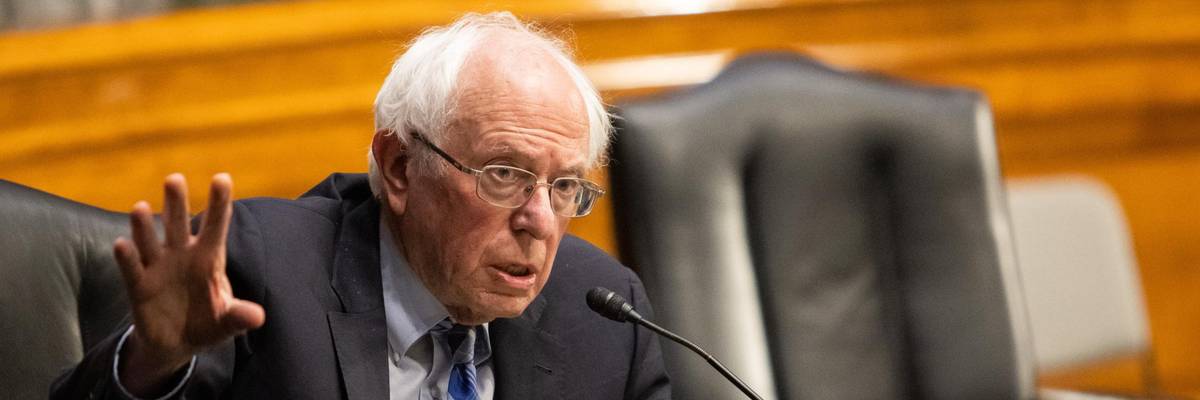Sen. Bernie Sanders of Vermont on Thursday urged Labor Secretary Marty Walsh to use his legal authority to ensure that jobless workers across the U.S. continue to receive emergency unemployment aid as Republican governors race to cut off crucial federal benefits months early.
"Next month, over 1.1 million workers in Alabama, Arkansas, Georgia, Idaho, Iowa, Mississippi, Missouri, Montana, North Dakota, South Carolina, South Dakota, Tennessee, Utah, and Wyoming will be at risk of losing some or all of the unemployment benefits Congress extended in the American Rescue Plan," Sanders (I-Vt.), the chair of the Senate Budget Committee, wrote in a letter (pdf) to Walsh.
"Workers who lack access to childcare, have lost employer-sponsored health insurance, and fear for their health and safety as we work to get every American vaccinated are entitled to these benefits."
--Sen. Bernie Sanders
Last March--as part of the Coronavirus Aid, Relief, and Economic Security (CARES) Act--Congress approved Pandemic Unemployment Assistance (PUA), a program designed to provide jobless benefits to gig workers and others who are not eligible for regular unemployment compensation.
The CARES Act also originally provided a $600-per-week federal boost on top of state-level jobless benefits--an add-on that has since been scaled back to $300 and is set to expire along with PUA in September.
But in recent days, Republican governors have moved to prematurely end both PUA and the $300 weekly enhancement for their residents, falsely claiming that the benefits are dissuading people from returning to the workforce--not lack of child care, low wages, pandemic-related health concerns, or other factors.
In his letter, Sanders argued that the U.S. Department of Labor (DOL) is obligated under the CARES Act to provide PUA aid and the $300-per-week supplement, given that "Congress did not grant states the ability to strip PUA benefits away from vulnerable workers."
"Further, the CARES Act requires that PUA benefits include the $300 top-off--even if states opt-out of this supplement for other benefit programs," wrote Sanders, who warned Walsh that many workers "will be forced into poverty--either with unfair wages or no income at all--if you fail to provide these benefits."
"Workers who lack access to childcare, have lost employer-sponsored health insurance, and fear for their health and safety as we work to get every American vaccinated are entitled to these benefits," the Vermont senator added.
Sanders is hardly alone in calling on Walsh to do everything in his power to ensure that jobless workers continue receiving benefits regardless of Republican governors' actions.
In statement earlier this week, Sen. Ron Wyden (D-Ore.) accused state GOP leaders of engaging in "economic sabotage by pulling the rug out from jobless workers" and implored the Labor Department to "explore all options to keep these workers from losing their income."
"Mothers without child care are not going to be back on the job in just a few weeks' time, and they shouldn't face financial ruin for living in states run by Republicans," added Wyden, who chairs the Senate Finance Committee.
Georgia Gov. Brian Kemp on Thursday became the latest Republican leader to announce that his state will no longer participate in PUA, the $300 weekly federal supplement, and other emergency unemployment programs. Eligible Georgians will continue receiving regular state unemployment benefits, which range from $55 to $365 per week.
Andrew Stettner of The Century Foundation estimates that if every Republican governor pulls out of the federally-funded emergency unemployment programs, 4.8 million workers would lose benefits early.
In a letter to Walsh on Tuesday, the National Employment Law Project (NELP) argued that unless the Labor Department takes action to compel states to continue distributing the benefits or pays the benefits itself, "DOL will not only cause significant harm to our most vulnerable, it will be in direct violation of their duty to provide PUA benefits under the CARES Act."
Read Sanders' full letter, which lays out a similar argument:
Dear Secretary Walsh:
In recent days, Republican governors across the country have abandoned unemployed workers in their states and indicated they will no longer offer life-saving federal unemployment aid. Next month, over 1.1 million workers in Alabama, Arkansas, Georgia, Idaho, Iowa, Mississippi, Missouri, Montana, North Dakota, South Carolina, South Dakota, Tennessee, Utah, and Wyoming will be at risk of losing some or all of the unemployment benefits Congress extended in the American Rescue Plan.
I am writing to remind you of your congressionally-mandated requirement to provide Pandemic Unemployment Assistance (PUA) benefits to workers ineligible for state unemployment aid and urging you to ensure workers receive these benefits even when states threaten to take it away. It is critical that the Department of Labor does everything in its power to ensure that jobless Americans continue to receive this aid as the law intended.
The PUA program has served as a backstop for our broken and outdated unemployment insurance (UI) system for over a year. State UI laws often exclude workers who are misclassified as independent contractors, part-time workers, and low-wage workers, and in all of these categories, workers of color are locked out of the system at much higher rates than white workers are. The benefit amounts offered are far too often much too low to provide any measure of economic security. State UI laws are also unequipped to support workers for the length necessary in this pandemic and recession, and the permanent federal program that is supposed to be of use during recessions and other crises is fatally flawed and simply put, doesn't work. Congress stepped in to make up for these inadequacies last March in the CARES Act and has extended them through September 6, 2021 to ensure that jobless Americans are supported as our economy recovers and we get workers back to good-paying jobs.
The CARES Act requires that you provide PUA benefits to every eligible worker. Section 2102(b), concerning PUA, reads:
The Secretary shall provide to any covered individual unemployment benefit assistance while such individual is unemployed, partially unemployed, or unable to work for the weeks of such unemployment with respect to which the individual is not entitled to any other unemployment compensation.
The Department of Labor, under former Secretary Scalia, acknowledged this obligation in a memo released on June 5, 2020 to the Department of Labor Inspector General:
The Secretary of Labor (Secretary) must provide PUA benefits to an individual who is determined to be eligible under the method described above. Under Section 2102(b), the Secretary "shall" provide to any covered individual unemployment benefit assistance while such individual is unemployed, partially unemployed, or unable to work for the weeks of such unemployment with respect to which he or she is not entitled to any other unemployment compensation. The relevant language is not discretionary.
The CARES Act gives states discretion over other pandemic-related unemployment insurance programs, such as Federal Pandemic Unemployment Compensation and Pandemic Emergency Unemployment Compensation. However, Congress did not grant states the ability to strip PUA benefits away from vulnerable workers. Further, the CARES Act requires that PUA benefits include the $300 top-off--even if states opt-out of this supplement for other benefit programs.
The CARES Act, section 2102(d)(1)(A), clearly states that the amount of PUA shall be:
the weekly benefit amount authorized under the unemployment compensation law of the State where the covered individual was employed, except that the amount may not be less than the minimum weekly benefit amount described in the section of 625.6 of title 20, Code of Federal Regulations, or any successor thereto; and the amount of Federal Pandemic Unemployment Compensation under section 2104 of this title.
According to the Government Accountability Office, the minimum PUA benefit is below the poverty level in 29 states. The $300 federal supplement has allowed jobless workers across the country to keep food on the table and a roof over their heads. Allowing state governors to cut this assistance off will guarantee jobless Americans plunge into poverty.
As Secretary, you are obligated to ensure this aid gets to workers. To ensure that obligation is met, I urge you to commit to holding states accountable for their role in administering PUA benefits. Workers who lack access to childcare, have lost employer-sponsored health insurance, and fear for their health and safety as we work to get every American vaccinated are entitled to these benefits. They will be forced into poverty--either with unfair wages or no income at all--if you fail to provide these benefits.
Thank you in advance for your attention to this important matter.




